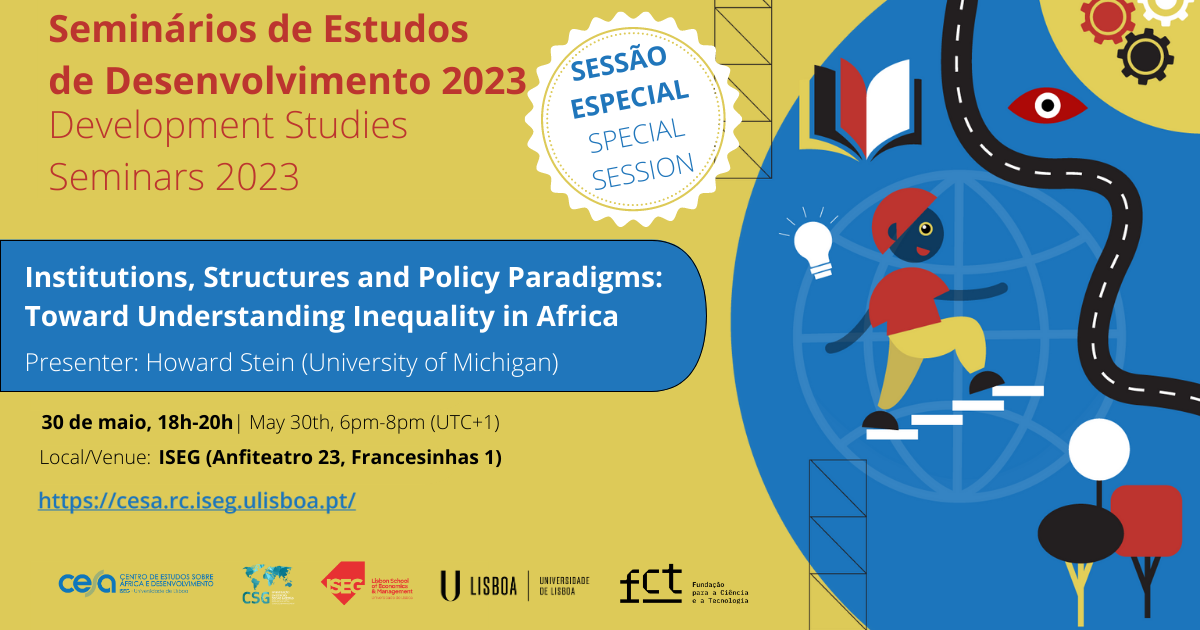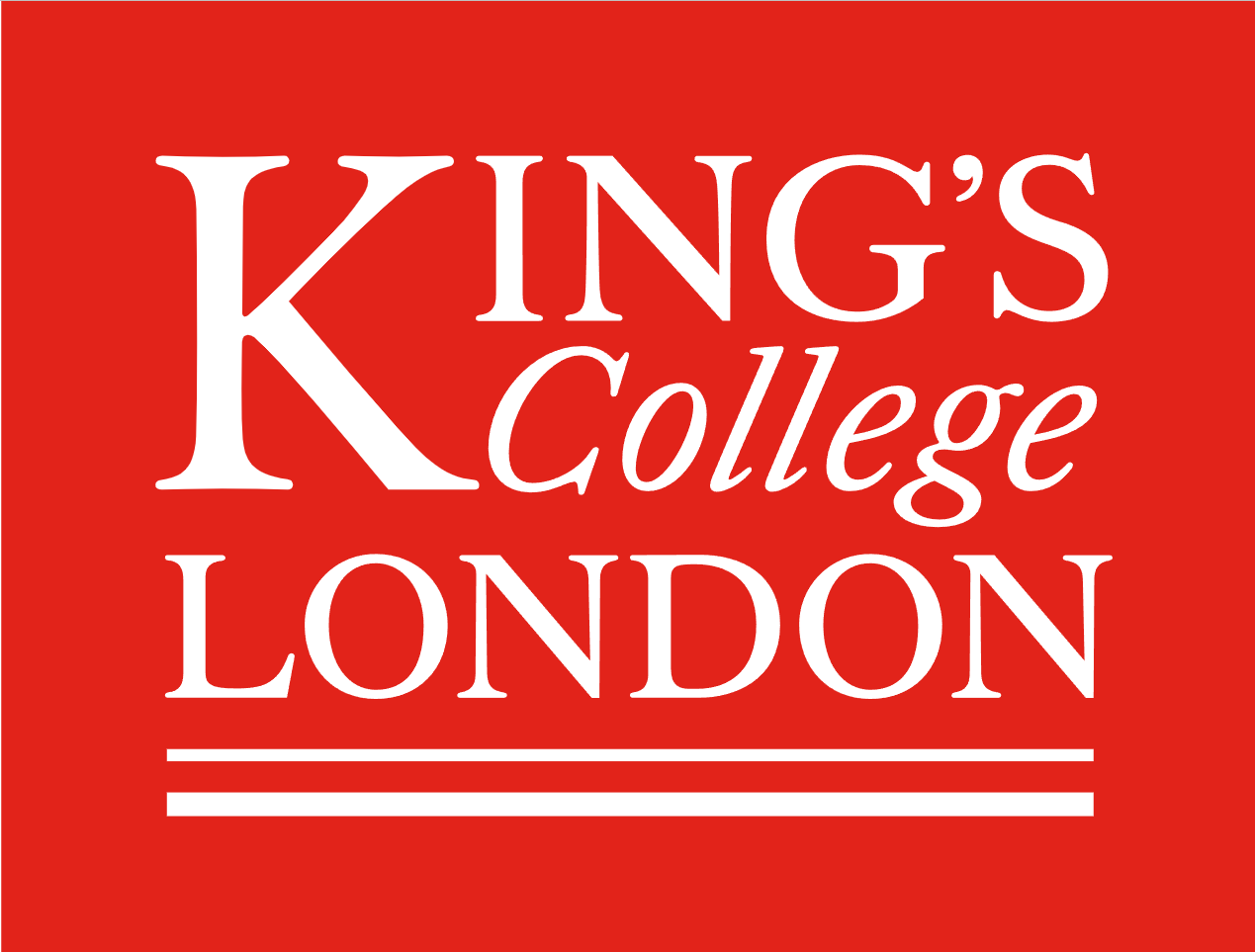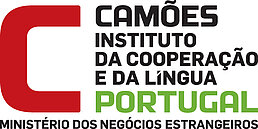CESA

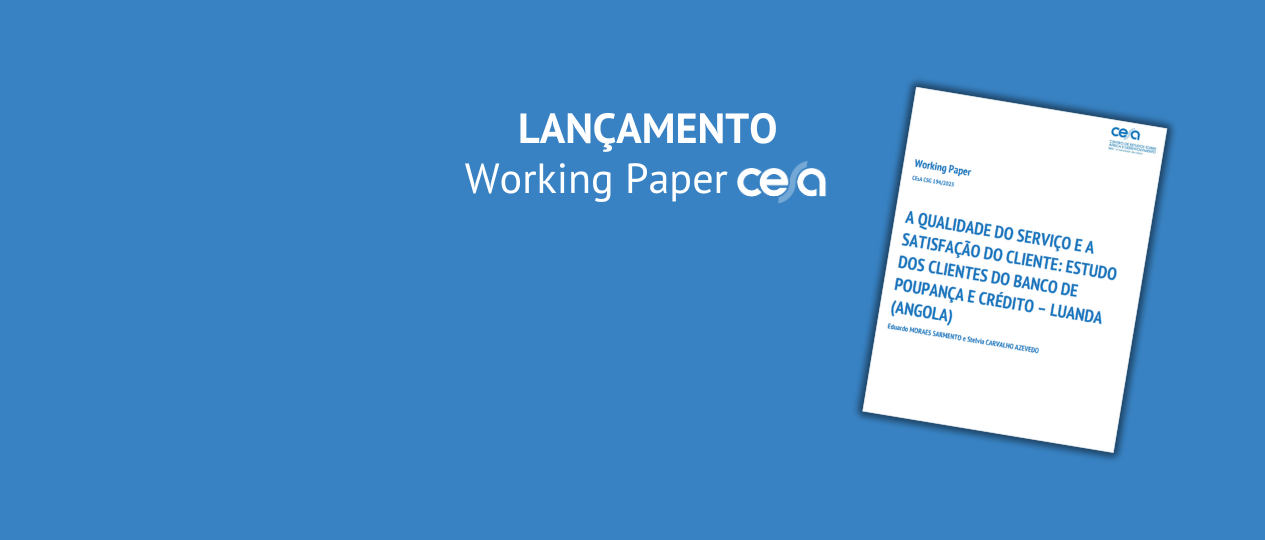
CESA Working Paper no. 194/2023 studies the quality of service and customer satisfaction of Banco de Poupança e Crédito in Luanda (Angola)
CEsA published its seventh Working Paper 2023: “A qualidade do serviço e a satisfação do cliente : estudo dos clientes do Banco de Poupança e Crédito – Luanda (Angola)” (“Quality of service and client satisfaction: study of the clients of Banco de Poupança e Crédito – Luanda, Angola), in Portuguese, authored by Eduardo Moraes Sarmento, CEsA researcher and professor in the Master’s in International Development and Cooperation at the Lisbon School of Economics and Management (ISEG).
Click here to access the Working Paper no. 194/2023:
https://www.repository.utl.pt/handle/10400.5/27742
Abstract:
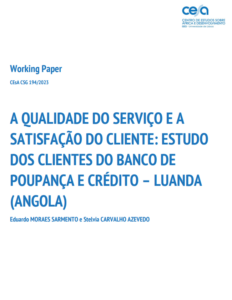 Nowadays, a correct and profitable way of managing the issue of service quality is to listen to customers, both satisfied and dissatisfied, to improve the information obtained, improve experiences with them and thus achieve greater levels of loyalty and, naturally, results. In this context, this study sought to assess the degree of customer satisfaction regarding the provision of the quality of services offered by Banco de Poupança e Crédito, located in Luanda (Angola) in order to identify the level of customer satisfaction according to the variables demographic and socioeconomic factors inherent to the SERVQUAL model and determine the correct methods and techniques for satisfaction, taking into account the elements of quality, in order to make the institution profitable. During this study, a structured interview was carried out for the Marketing and Communication Department and a questionnaire of 15 questions was applied, resulting in only 80 valid questionnaires out of 150. The same were applied during working hours to assess the quality of the service provided by the bank. From a modern company, as with the Bank, it is expected that its main objective is to provide customer satisfaction, indiscriminately needing all the company’s employees and for this it is necessary that they are satisfied to adopt attitudes consistent with this objective. However, managing these factors well to achieve positive results is an essential condition for the company to overcome the challenges.
Nowadays, a correct and profitable way of managing the issue of service quality is to listen to customers, both satisfied and dissatisfied, to improve the information obtained, improve experiences with them and thus achieve greater levels of loyalty and, naturally, results. In this context, this study sought to assess the degree of customer satisfaction regarding the provision of the quality of services offered by Banco de Poupança e Crédito, located in Luanda (Angola) in order to identify the level of customer satisfaction according to the variables demographic and socioeconomic factors inherent to the SERVQUAL model and determine the correct methods and techniques for satisfaction, taking into account the elements of quality, in order to make the institution profitable. During this study, a structured interview was carried out for the Marketing and Communication Department and a questionnaire of 15 questions was applied, resulting in only 80 valid questionnaires out of 150. The same were applied during working hours to assess the quality of the service provided by the bank. From a modern company, as with the Bank, it is expected that its main objective is to provide customer satisfaction, indiscriminately needing all the company’s employees and for this it is necessary that they are satisfied to adopt attitudes consistent with this objective. However, managing these factors well to achieve positive results is an essential condition for the company to overcome the challenges.
Get to know the previous editions, published in 2023:
Working Paper 189/2023: Fragilities and shocks effects on households and communities in West Africa
Author: CEsA Communications (comunicacao@cesa.iseg.ulisboa.pt)
Images: CEsA/Reproduction
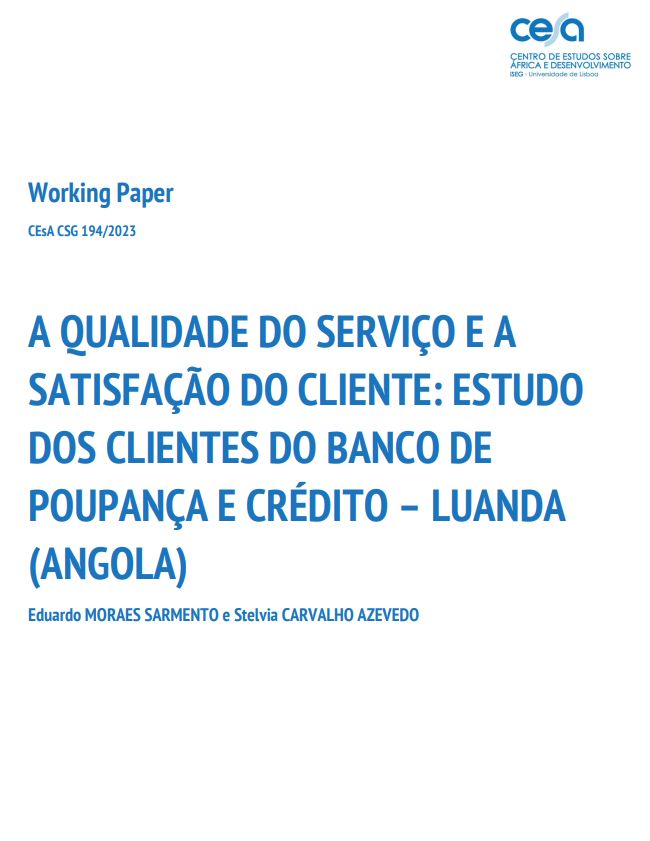
Working Paper 194/2023: A Qualidade do Serviço e a Satisfação do Cliente: Estudo dos Clientes do Banco de Poupança e Crédito – Luanda (Angola)
Abstract:
Nowadays, a correct and profitable way of managing the issue of service quality is to listen to customers, both satisfied and dissatisfied, to improve the information obtained, improve experiences with them and thus achieve greater levels of loyalty and, naturally, results. In this context, A Qualidade do Serviço e a Satisfação do Cliente: Estudo dos Clientes do Banco de Poupança e Crédito – Luanda (Angola) sought to assess the degree of customer satisfaction regarding the provision of the quality of services offered by Banco de Poupança e Crédito, located in Luanda (Angola) in order to identify the level of customer satisfaction according to the variables demographic and socioeconomic factors inherent to the SERVQUAL model and determine the correct methods and techniques for satisfaction, taking into account the elements of quality, in order to make the institution profitable. During this study, a structured interview was carried out for the Marketing and Communication Department and a questionnaire of 15 questions was applied, resulting in only 80 valid questionnaires out of 150. The same were applied during working hours to assess the quality of the service provided by the bank. From a modern company, as with the Bank, it is expected that its main objective is to provide customer satisfaction, indiscriminately needing all the company’s employees and for this it is necessary that they are satisfied to adopt attitudes consistent with this objective. However, managing these factors well to achieve positive results is an essential condition for the company to overcome the challenges.
Quotation:
Sarmento, E. M. e Azevedo, S. C. (2023). “A Qualidade do Serviço e a Satisfação do Cliente: Estudo dos Clientes do Banco de Poupança e Crédito – Luanda (Angola)”. Instituto Superior de Economia e Gestão – CEsA/CGS – Documentos de trabalho nº 194/2023

The Guardian and Público echo a special report on Guinea-Bissau’s seed keepers written within the scope of a grant awarded by ACEP and CEsA
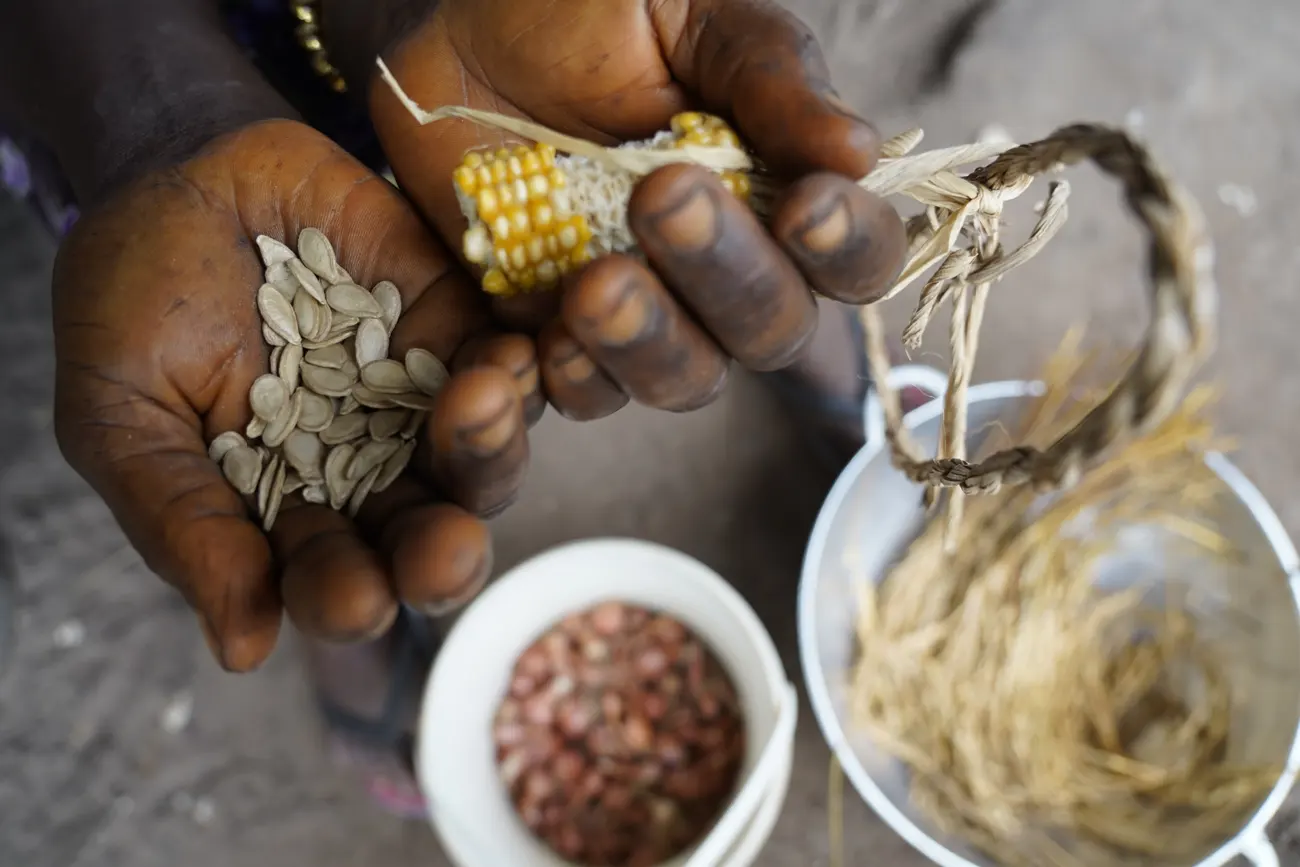
The Guardian – Global Development and Público – Azul Notícias have echo the special report “Ilhas Urok, Guiné-Bissau. As guardiãs de sementes dos Bijagós” (“Ilhas Urok, Guinea-Bissau. As guardians of Bijagós seeds”, in English), authored by the journalist and PhD in Studies in Communication and Development, Vanessa Rodrigues, and with the support of the NGO Tiniguena and the bijagó journalist José António Abúdu.
The special report was written within the scope of the Bolsa de Criação Jornalística sobre Desenvolvimento 2022 (2022 Journalistic Creation Scholarship on Development, in English), granted by the Associação para a Cooperação Entre os Povos (ACEP), in partnership with the Centre for African and Development Studies (CEsA/CSG/ISEG/ULisboa), and with the support of Camões, Instituto da Cooperação e da Língua.
Read the special report “Ilhas Urok, Guiné-Bissau. As guardiãs de sementes dos Bijagós” (in Portuguese), published on September 30, 2022 in the supplement Azul Notícias, from Público: https://www.publico.pt/2022/09/30/azul/noticia/ilhas-urok-guinebissau-guardias-seeds-bijagos-2022452
Listen to the podcast “Guardiãs de sementes e mulheres rurais na Guiné-Bissau: elas cuidam do futuro da terra” (in Portuguese), available on October 3, 2022 in the supplement Azul Notícias, from Público: https://www.publico.pt/2022/10/03/azul/noticia/guardias-sementes-mulheres-rurais-guinebissau-cuidam-futuro-terra-2022533
Read the English version of the special report, “’Seeds ensure our survival’: the women of Guinea-Bissau who keep vital plants and culture alive”, published on May 2nd, 2023 in the Global Development section of The Guardian: https://www.theguardian.com/global-development/2023/may/02/women-of-guinea-bissau-who-keep-vital-plants-and-culture-alive?fbclid=IwAR1TPOq78otqShBOG-K0stzDeXSppA6WGQppYAYf-1xVPBVky3x47a19Gt8
Author: CEsA Communication (comunicacao@cesa.iseg.ulisboa.pt)
Image: Vanessa Rodrigues/The Guardian Reproduction
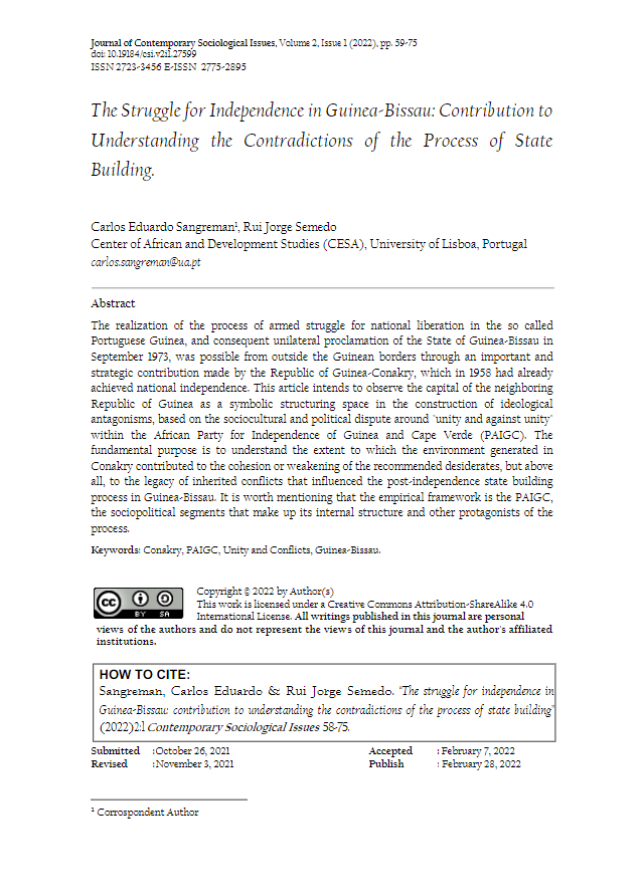
The Struggle for Independence in Guinea-Bissau – Contribution to Understanding the Contradictions of the Process of State Building
Abstract:
The realization of the process of armed struggle for national liberation in the so called Portuguese Guinea, and consequent unilateral proclamation of the State of Guinea-Bissau in September 1973, was possible from outside the Guinean borders through an important and strategic contribution made by the Republic of Guinea-Conakry, which in 1958 had already achieved national independence. This article intends to observe the capital of the neighboring Republic of Guinea as a symbolic structuring space in the construction of ideological antagonisms, based on the sociocultural and political dispute around “unity and against unity” within the African Party for Independence of Guinea and Cape Verde (PAIGC). The fundamental purpose isto understand the extent to which the environment generated in Conakry contributed to the cohesion or weakening of the recommended desiderates, but above all,to the legacy of inherited conflicts that influenced thepost-independence state building processin Guinea-Bissau. It is worth mentioning thatthe empirical framework is the PAIGC, the sociopolitical segments that make up its internal structure and other protagonists of the process.
Quotation:
SANGREMAN, Carlos Eduardo; SEMEDO, Rui Jorge. The Struggle for Independence in Guinea-Bissau. Journal of Contemporary Sociological Issues, [S.l.], v. 2, n. 1, p. 59-75, feb. 2022. ISSN 2775-2895. Available at: <https://jurnal.unej.ac.id/index.php/JCSI/article/view/27599>. Date accessed: 04 may 2023. doi: https://doi.org/10.19184/csi.v2i1.27599.

Development Studies Seminars 2023 | May 30th | Institutions, Structures and Policy Paradigms: Toward Understanding Inequality in Africa | Howard Stein (University of Michigan)
The Centre for African and Development Studies (CEsA/CSG/ISEG/ULisboa) and the coordination of the Masters in Development and International Cooperation (MDCI) and the PhD in Development Studies (PDED) courses at ISEG – Lisbon School of Economics and Management, University of Lisbon (ULisboa), invite you to the Special Session of the Development Studies Seminars 2023, which will have as its theme “Institutions, Structures and Policy Paradigms: Toward Understanding Inequality in Africa” and will be presented by the University of Michigan’s researcher Howard Stein on May 30th, 2023, from 6 pm to 8 pm (UTC+1), at ISEG (Anfiteatro 23, Francesinhas 1, 1200-781, Lisbon, Portugal).
REGISTER HERE: https://www.eventbrite.pt/e/bilhetes-seminarios-de-estudos-de-desenvolvimento-2023-com-howard-stein-umich-625248263387
About the presenter
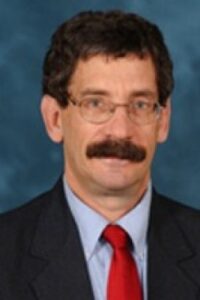
Howard Stein is a Professor in the Department of Afroamerican and African Studies (DAAS) and the Department of Epidemiology at the University of Michigan. He is a development economist educated in Canada, the US and the UK who has taught in both Asia and Africa. He is the editor or author of more than a dozen books and edited collections and more than 100 journal articles, book chapters and reviews. His research on Africa has focused on foreign aid, finance, structural adjustment and neoliberalism, RCTs, health, gender and development, health and the environment, institutional transformation, industrial policy, export processing zones and other industrial parks, agricultural policy, poverty and rural property right transformation, income inequality and Chinese investment in manufacturing. He teaches a variety of courses in DAAS and Epidemiology including the history of African economic development, Africa and post-war development theory and policy, globalization and African health, the political economy of African development and health and socio-economic development.
Related content:
- Book Chapter “Institutions, Structures, and Policy Paradigms: Toward Understanding Inequality in Africa”, In: The Political Economy of Inequality: U.S. and Global Dimensions (eds. Sisay Asefa and Wei-Chiao Huang)
- YouTube: Makerere History Seminar – Institutionalizing Neoclassical Economics in Africa: Instruments, Ideology and Implications
- YouTube: Development Studies Seminars 2022. April 21st, 2022. Theme: “Global Finance and the Covid-19 Pandemic in Africa”. Presenter: Howard Stein (University of Michigan)
- Working Paper N. 54/1999: “Structural adjustment and the African crisis: a theoretical appraisal”. Authors: Stein, H. e Nissanke, M.
About the event
The Development Studies Seminars 2023 are an initiative that, since 1991, promotes research carried out in the areas of study of MDCI/ISEG/ULisboa and PDED/ISEG/ULisboa. The 2023 edition will take place from February 28 2023, always on Tuesdays, from 6 pm to 8 pm (UTC+1), at ISEG (Anfiteatro 23, Francesinhas 1, 1200-781, Lisbon, Portugal). Sessions will be in a face-to-face format and with free admission. We recommend prior registration on the CEsA profile on EventBrite (click here), but the capacity of the amphitheater will be filled in order of arrival.
Special Session of the Development Studies Seminars 2023
Theme: Institutions, Structures and Policy Paradigms: Toward Understanding Inequality in Africa
Presenter: Howard Stein (University of Michigan)
Date and time: May 30th, 2023, always on Tuesdays, from 6 pm to 8 pm (UTC+1)
In-person event at ISEG (Anfiteatro 23, Francesinhas 1, 1200-781, Lisbon, Portugal)
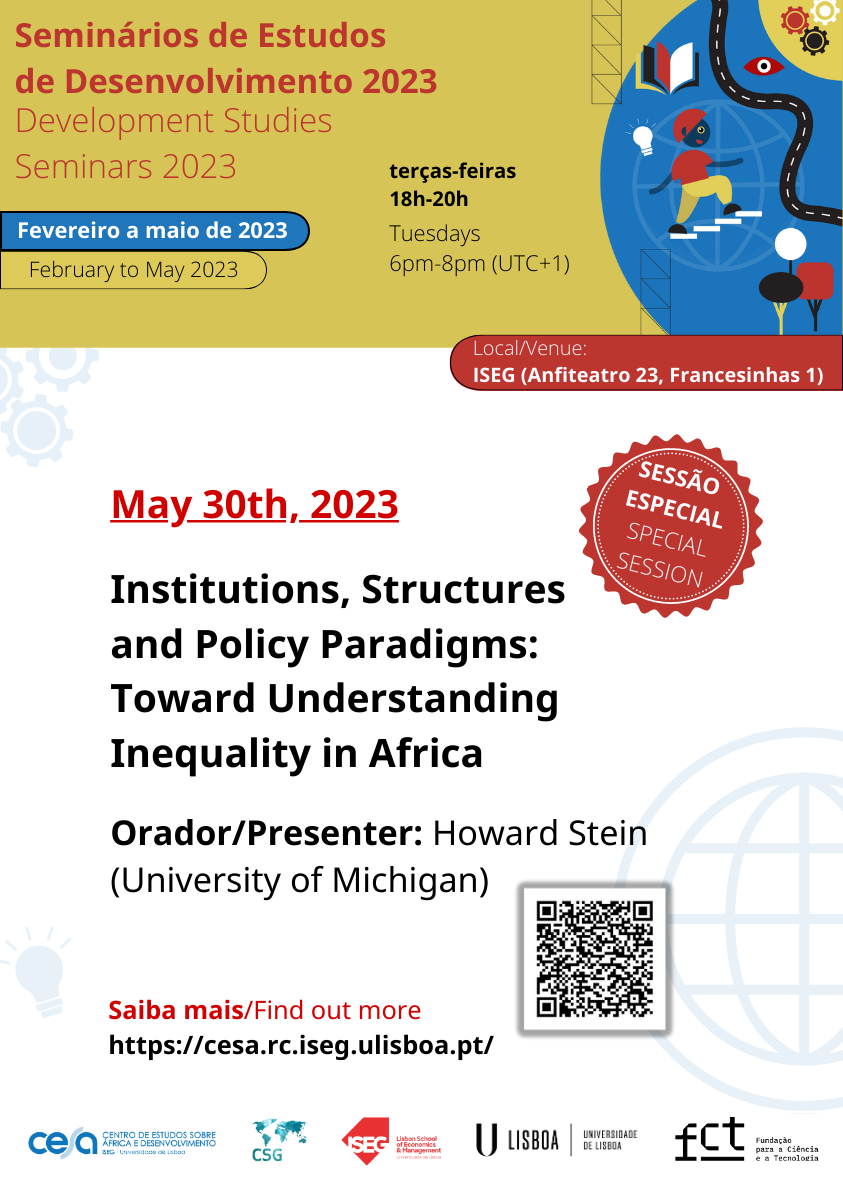
Read more:
Development Studies Seminars 2023 will return on February 28 at ISEG
Playlist “Development Studies Seminars 2023” on CEsA’s YouTube channel
Did you miss a session? Watch all Development Studies Seminars 2022 presentations
Applications for the 2023/24 PhD in Development Studies (PDED) are open
Author: CEsA Communication (comunicacao@cesa.iseg.ulisboa.pt)
Image: CEsA/Reproduction
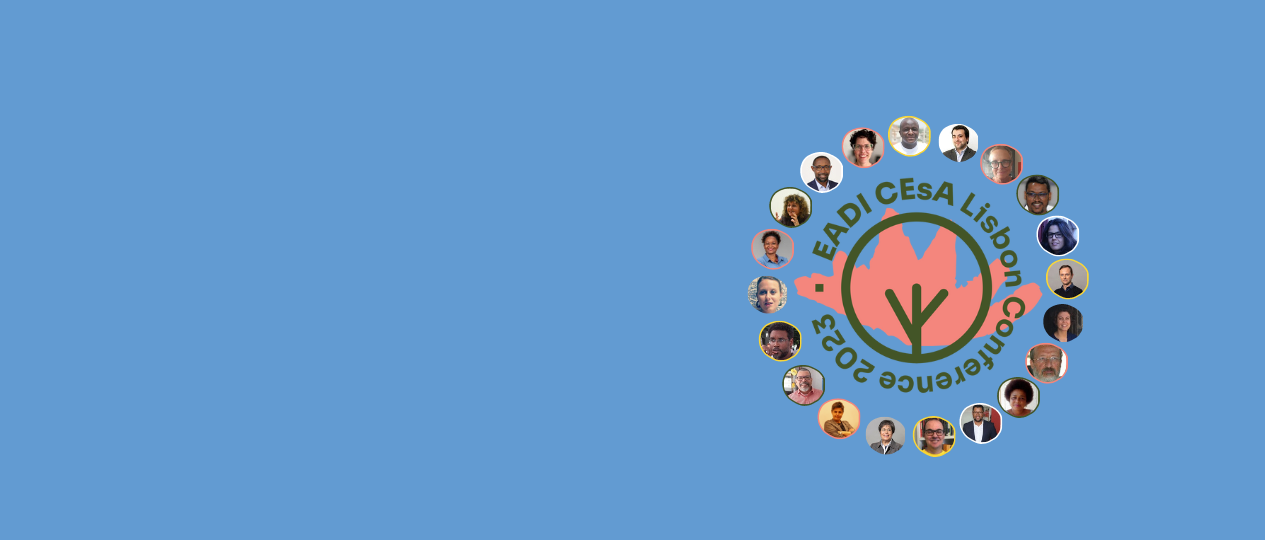
EADI CEsA Lisbon Conference 2023 releases the preliminary programme of the largest European conference on Development Studies
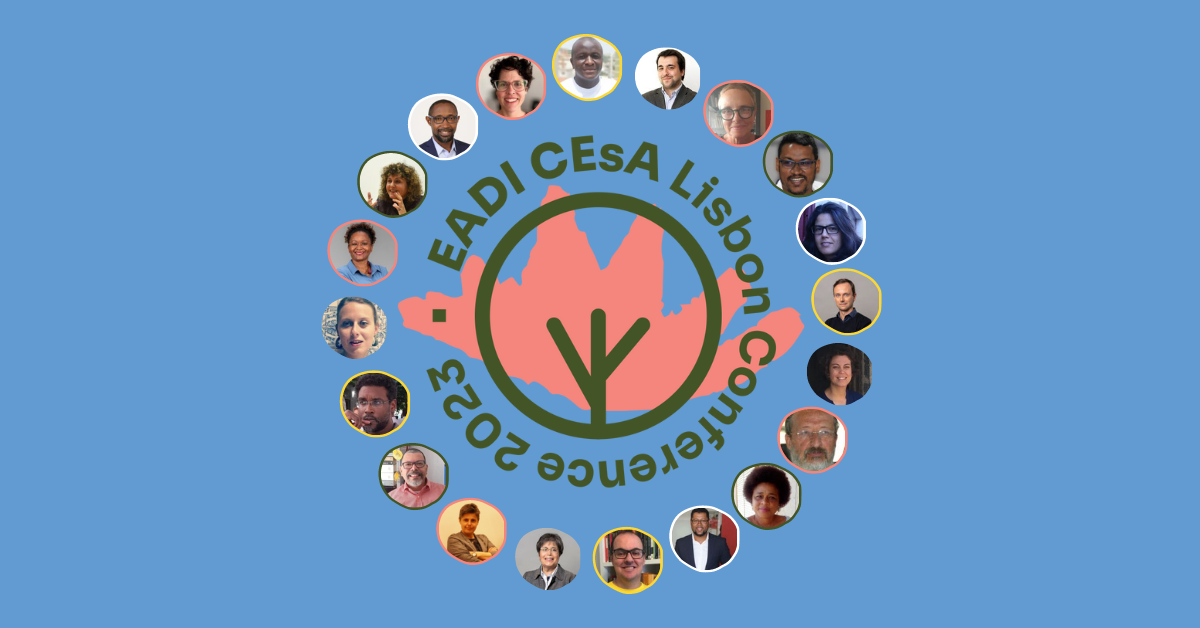
The largest European conference on Development Studies, the EADI CEsA Lisbon Conference 2023: Towards New Rhythms of Development, which will take place between the 10th and 13th of July 2023 at ISEG – Lisbon School of Economics and Management, in Lisbon, just released the preliminary programme of the 2023 edition. Twenty CEsA researchers are already confirmed as presenters and/or chairs in eight conference panels (the list of researchers and panels can be consulted at the end of the text).
The Centre for African and Development Studies (CEsA/CSG/ISEG/ULisbon) is the co-organiser of the event, which is being held in Lisbon, Portugal for the first time. The General Conference, organised by the European Association of Development Research and Training Institute (EADI) every three years since 1975, will be in hybrid format (in-person and online) and registration is open. Prices vary, depending on the participation category chosen, between €95 and €335. There are discounts for EADI members and PhD students.
Consult the list of CEsA researchers who are in the preliminary programme of the EADI CEsA Lisbon Conference 2023:
 Alexandre Abreu (chair of the Seed Panel 4: Inequality Dynamics in Portuguese-speaking Developing Countries, 11 de julho de 2023, 14h30-16h)
Alexandre Abreu (chair of the Seed Panel 4: Inequality Dynamics in Portuguese-speaking Developing Countries, 11 de julho de 2023, 14h30-16h)
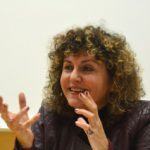 Ana Mafalda Leite (chair of the Roundtable 7: New Rhythms of Development in African Literature and Arts, 13 de julho, 14h30-16h)
Ana Mafalda Leite (chair of the Roundtable 7: New Rhythms of Development in African Literature and Arts, 13 de julho, 14h30-16h)
 Arlindo Fortes (chair of the Harvest Panel 7: Metamorphoses of Capitalism, Ecological and Social Crises: Questions and possibilities, 11 de julho de 2023, 16h30-18h; and chair of the Seed Panel 30: Rural/Urban Space in Sub-Saharan Africa and the Dynamics of Climate Change, 12 de julho de 2023, 14h30-16h)
Arlindo Fortes (chair of the Harvest Panel 7: Metamorphoses of Capitalism, Ecological and Social Crises: Questions and possibilities, 11 de julho de 2023, 16h30-18h; and chair of the Seed Panel 30: Rural/Urban Space in Sub-Saharan Africa and the Dynamics of Climate Change, 12 de julho de 2023, 14h30-16h)
 Carlos Sangreman (chair of the Seed Panel 4: Inequality Dynamics in Portuguese-speaking Developing Countries, 11 de julho de 2023, 14h30-16h)
Carlos Sangreman (chair of the Seed Panel 4: Inequality Dynamics in Portuguese-speaking Developing Countries, 11 de julho de 2023, 14h30-16h)
 Diogo Maia (presenter in the Seed Panel 4: Inequality Dynamics in Portuguese-speaking Developing Countries, Tema: FDI, Economic Growth and Inqueality in Mozambique 11 de julho de 2023, 14h30-16h)
Diogo Maia (presenter in the Seed Panel 4: Inequality Dynamics in Portuguese-speaking Developing Countries, Tema: FDI, Economic Growth and Inqueality in Mozambique 11 de julho de 2023, 14h30-16h)
 Edvaldo Bergamo (presenter in the Roundtable 7: New Rhythms of Development in African Literature and Arts, 13 de julho, 14h30-16h)
Edvaldo Bergamo (presenter in the Roundtable 7: New Rhythms of Development in African Literature and Arts, 13 de julho, 14h30-16h)
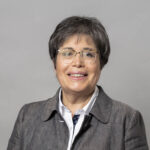 Elsa Fontainha (presenter in the Harvest Panel 11: Women Entrepreneurs on the African Continent, Tema: Women Entrepreneurs Coping with Shocks: The case of Covid-19 in four Sub-Saharan African countries, 13 de julho de 2023, 9h-10h30)
Elsa Fontainha (presenter in the Harvest Panel 11: Women Entrepreneurs on the African Continent, Tema: Women Entrepreneurs Coping with Shocks: The case of Covid-19 in four Sub-Saharan African countries, 13 de julho de 2023, 9h-10h30)
 Fernanda Gallo (presenter in the Roundtable 7: New Rhythms of Development in African Literature and Arts, 13 de julho, 14h30-16h)
Fernanda Gallo (presenter in the Roundtable 7: New Rhythms of Development in African Literature and Arts, 13 de julho, 14h30-16h)
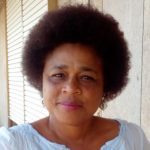 Iolanda Évora (presenter in the Roundtable 11: As Economias Informais e o Papel das Associações Comunitárias nas Periferias dos Maiores Centros Urbanos de Cabo Verde no Contexto da Pandemia de Covid-19, 12 de julho de 2023, 14h30-16h)
Iolanda Évora (presenter in the Roundtable 11: As Economias Informais e o Papel das Associações Comunitárias nas Periferias dos Maiores Centros Urbanos de Cabo Verde no Contexto da Pandemia de Covid-19, 12 de julho de 2023, 14h30-16h)
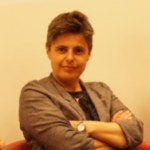 Jessica Falconi (chair of the Roundtable 7: New Rhythms of Development in African Literature and Arts, 13 de julho, 14h30-16h)
Jessica Falconi (chair of the Roundtable 7: New Rhythms of Development in African Literature and Arts, 13 de julho, 14h30-16h)
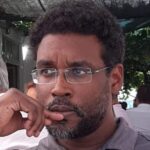 João Van Dunem (presenter in the Seed Panel 4: Inequality Dynamics in Portuguese-speaking Developing Countries, Tema: What Drove Economic Inequality Under Portuguese Colonial Rule? The case of Angola, 11 de julho de 2023, 14h30-16h)
João Van Dunem (presenter in the Seed Panel 4: Inequality Dynamics in Portuguese-speaking Developing Countries, Tema: What Drove Economic Inequality Under Portuguese Colonial Rule? The case of Angola, 11 de julho de 2023, 14h30-16h)
 Marcelo Moreira (chair of the Harvest Panel 7: Metamorphoses of Capitalism, Ecological and Social Crises: Questions and possibilities, 11 de julho de 2023, 16h30-18h; and chair of the Seed Panel 30: Rural/Urban Space in Sub-Saharan Africa and the Dynamics of Climate Change, 12 de julho de 2023, 14h30-16h)
Marcelo Moreira (chair of the Harvest Panel 7: Metamorphoses of Capitalism, Ecological and Social Crises: Questions and possibilities, 11 de julho de 2023, 16h30-18h; and chair of the Seed Panel 30: Rural/Urban Space in Sub-Saharan Africa and the Dynamics of Climate Change, 12 de julho de 2023, 14h30-16h)
 Marta Banasiak (presenter in the Roundtable 7: New Rhythms of Development in African Literature and Arts, 13 de julho, 14h30-16h)
Marta Banasiak (presenter in the Roundtable 7: New Rhythms of Development in African Literature and Arts, 13 de julho, 14h30-16h)
 Odair Barros-Varela (chair of the Roundtable 11: As Economias Informais e o Papel das Associações Comunitárias nas Periferias dos Maiores Centros Urbanos de Cabo Verde no Contexto da Pandemia de Covid-19, 12 de julho de 2023, 14h30-16h)
Odair Barros-Varela (chair of the Roundtable 11: As Economias Informais e o Papel das Associações Comunitárias nas Periferias dos Maiores Centros Urbanos de Cabo Verde no Contexto da Pandemia de Covid-19, 12 de julho de 2023, 14h30-16h)
 Redy Wilson Lima (chair of the Roundtable 11: As Economias Informais e o Papel das Associações Comunitárias nas Periferias dos Maiores Centros Urbanos de Cabo Verde no Contexto da Pandemia de Covid-19, 12 de julho de 2023, 14h30-16h)
Redy Wilson Lima (chair of the Roundtable 11: As Economias Informais e o Papel das Associações Comunitárias nas Periferias dos Maiores Centros Urbanos de Cabo Verde no Contexto da Pandemia de Covid-19, 12 de julho de 2023, 14h30-16h)
 Sara Laisse (presenter in the Roundtable 7: New Rhythms of Development in African Literature and Arts, 13 de julho, 14h30-16h)
Sara Laisse (presenter in the Roundtable 7: New Rhythms of Development in African Literature and Arts, 13 de julho, 14h30-16h)
 Sílvia Amaral (presenter in the Harvest Panel 14: Exploring the Rhythms of Urbanisation and Conflict, Tema: Armed Conflict and Urbanization in Cabo Delgado, Mozambique: A case study of two neighbourhoods in the city of Pemba, 11 de julho, 16h30-18h)
Sílvia Amaral (presenter in the Harvest Panel 14: Exploring the Rhythms of Urbanisation and Conflict, Tema: Armed Conflict and Urbanization in Cabo Delgado, Mozambique: A case study of two neighbourhoods in the city of Pemba, 11 de julho, 16h30-18h)
 Sónia Frias (chair of the Harvest Panel 7: Metamorphoses of Capitalism, Ecological and Social Crises: Questions and possibilities, 11 de julho de 2023, 16h30-18h; and chair of the Seed Panel 30: Rural/Urban Space in Sub-Saharan Africa and the Dynamics of Climate Change, 12 de julho de 2023, 14h30-16h)
Sónia Frias (chair of the Harvest Panel 7: Metamorphoses of Capitalism, Ecological and Social Crises: Questions and possibilities, 11 de julho de 2023, 16h30-18h; and chair of the Seed Panel 30: Rural/Urban Space in Sub-Saharan Africa and the Dynamics of Climate Change, 12 de julho de 2023, 14h30-16h)
 Susana Brissos (chair of the Seed Panel 34: New Food Policy for Sustainable Food Systems, 12 de julho de 2023, 14h30-16h)
Susana Brissos (chair of the Seed Panel 34: New Food Policy for Sustainable Food Systems, 12 de julho de 2023, 14h30-16h)
 Vincent Agulonye (presenter in the Seed Panel 30: Rural/Urban Space in Sub-Saharan Africa and the Dynamics of Climate Change, Tema: When We Eat of Seeds: A study of the effects of informal mining on the environment, food and water security, 12 de julho de 2023, 14h30-16h)
Vincent Agulonye (presenter in the Seed Panel 30: Rural/Urban Space in Sub-Saharan Africa and the Dynamics of Climate Change, Tema: When We Eat of Seeds: A study of the effects of informal mining on the environment, food and water security, 12 de julho de 2023, 14h30-16h)
Read more:
Partners in organizing the event:
Support:
Author: CEsA Communication (comunicacao@cesa.iseg.ulisboa.pt)
Image: CEsA/Reproduction and EADI
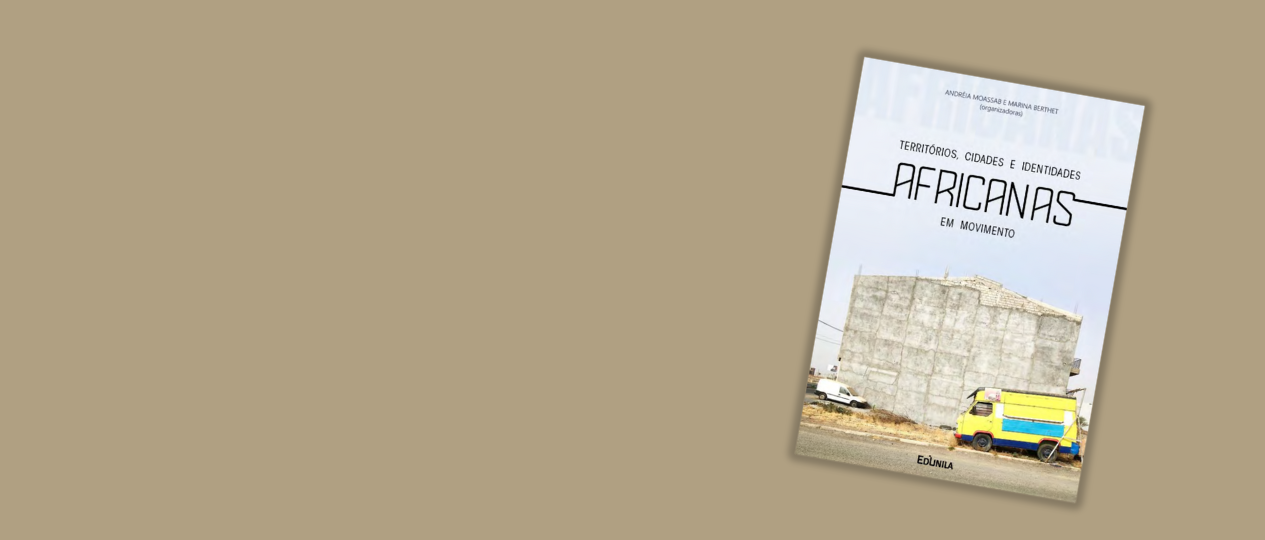
Odair Barros-Varela and Redy Wilson Lima, CEsA researchers, publish articles in the book “Territórios, cidades e identidades africanas em movimento” (ed. EDUNILA)
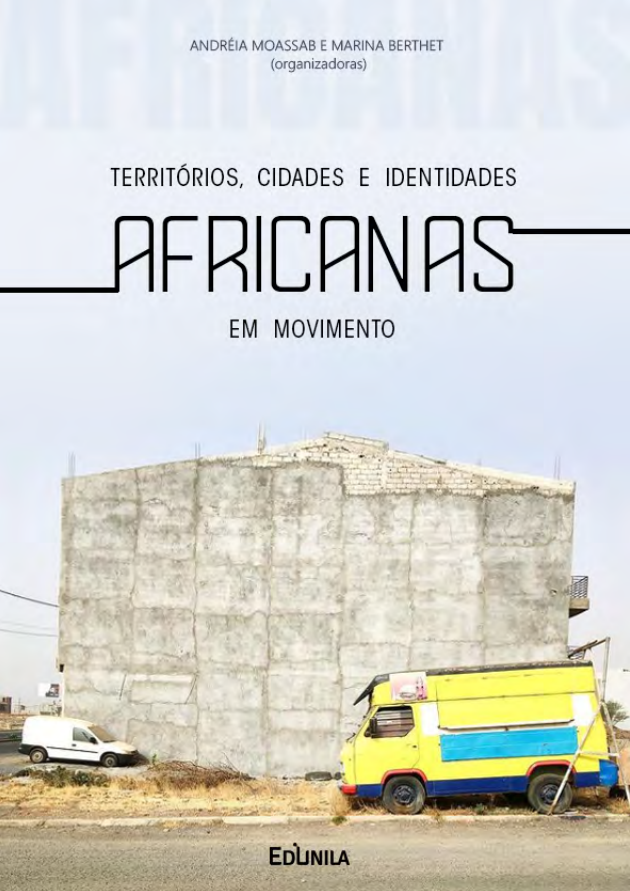
CEsA researchers Odair Barros-Varela and Redy Wilson Lima have published the research articles “África, o berço da modernidade: por uma visão pós-colonial da modernidade e do território” and “Hip-hop em Cabo Verde: rap e representação do espaço público na cidade da Praia”, respectively. The articles contitute the chapters 1 and 6 of the book “Territórios, cidades e identidades africanas em movimento”, organized by Andréia Moassab and Marina Berthet (publisher: EDUNILA).
Click on the following links to access the pages of each article in the Repository of the University of Lisbon:
África, o berço da modernidade: por uma visão pós-colonial da modernidade e do território – https://www.repository.utl.pt/handle/10400.5/27650
Hip-hop em Cabo Verde: rap e representação do espaço público na cidade da Praia – https://www.repository.utl.pt/handle/10400.5/27651
Read the abstracts:
África, o berço da modernidade: por uma visão pós-colonial da modernidade e do território
It is necessary to take a brief look at what is conventionally called modernity and what constitutes the substratum on which the “West” anchors itself for a triumphant and universalist autonarrative. Various authors, mainly from the mid-eighties onwards, have sought to demystify the origins of Western civilisation and modernity, most notably the three volumes of Black Athena: The Afroasiatic Roots of Classical Civilization (1987/1991/2006), by Martin Gardiner Bernal.2 Other authors have followed in Bernal’s footsteps to some extent, one of them being the philosopher and historian Enrique Dussel with his work Política de La Liberación: Historia Mundial y Crítica [Liberation Policy: World History and Critique] (2007): World History and Critique] (2007), in which, situated in the field of postcolonial theory, he argues that Hellenocentrism is the father of Eurocentrism and that, given that the so-called “Greek miracle” by the German Romantics of the eighteenth century does not exist, this means having to start “anew” the history of political philosophy. To this end, he considers it essential to redefine the beginning of modernity. It is worth pointing out that it is “postmodernity” – called the historical period that seeks to overcome, or surpasses, modernity – that will give rise, in Western academia and its satellites, not only to a debate about the “postmodern condition” – or about its being the “cultural logic of late capitalism” – but also about the “vision” of modernity itself. Although many prefer expressions other than “postmodern”, or change their preference -such as Zygmunt Bauman, who starts talking about “liquid modernity”, or Gilles Lipovetsky, who prefers the term “hypermodernity”, or others who talk about “incomplete modernity”, or “late modernity” or “alternative modernities”-, in essence they do not put the emphasis on a critical analysis of the hegemonic Anglo-Saxon periodisation of modernity.
Hip-hop em Cabo Verde: rap e representação do espaço público na cidade da Praia
Despite the strong connection with Portugal and the existence in that country of numerous rap groups composed of Cape Verdeans or descendants of Cape Verdeans, the hip-hop produced there is practically ignored and very little consumed by young people, namely those from the periphery, to the detriment of the North American black ghetto culture, known through the audiovisual flows of the digital era. Young people all over the world are seen as a risk factor, an association that is particularly patent in the modern discourse on security, especially in an era in which a part of young people associate themselves with street gangs, revealing “the failure of the expected reproduction of the support mechanisms of an expansive and optimistic capitalism”, which provides the so-called “Welfare State”. Thus, in the face of a feeling of juvenile unease, evidenced in some actions that destabilize the social order and the “Creole morabeza”, it becomes mandatory that the institutions that protect this population layer control them, reprogramming them institutionally, thus building a State Social Service.
Author: CEsA Communication (comunicacao@cesa.iseg.ulisboa.pt)
Image: EDUNILA/Reproduction
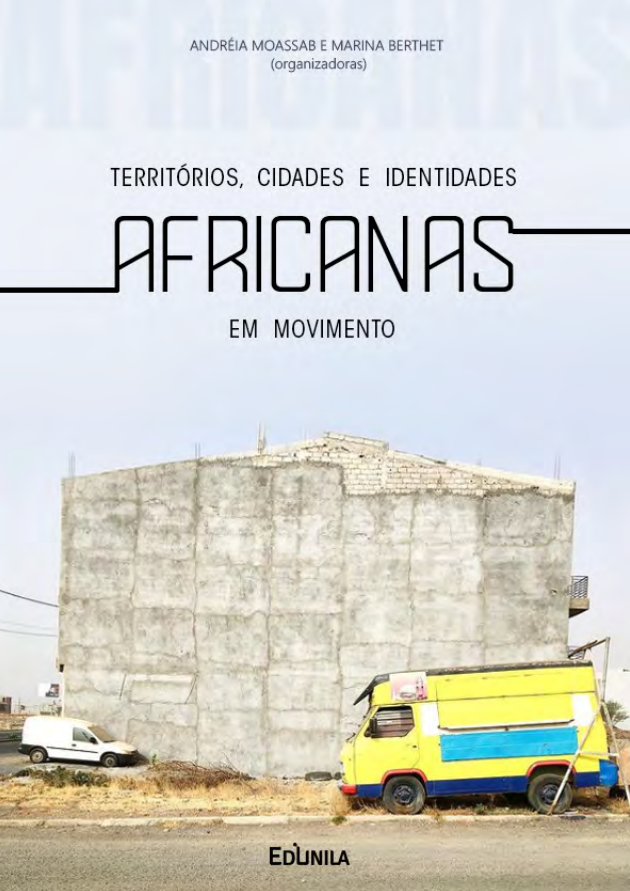
Hip-hop em Cabo Verde: rap e representação do espaço público na cidade da Praia
Abstract:
In Hip-hop em Cabo Verde: rap e representação do espaço público na cidade da Praia, the author studies how, despite the strong link with Portugal and the existence in that country of numerous rap groups composed of Cape Verdeans or descendants of Cape Verdeans, the hip-hop produced there is practically ignored and very little consumed by young people, particularly those from the periphery, to the detriment of the culture of North American black ghettos, known through the audiovisual flows of the digital era. Young people all over the world are seen as a risk factor, an association that is particularly patent in the modern discourse on security, especially in an era in which a part of young people associate themselves with street gangs, revealing “the failure of the expected reproduction of the support mechanisms of an expansive and optimistic capitalism”, which provides the so-called “Welfare State”. Thus, in the face of a feeling of juvenile unease, evidenced in some actions that destabilize the social order and the “Creole morabeza”, it becomes mandatory that the institutions that protect this population layer control them, reprogramming them institutionally, thus building a State Social Service.
Quotation:
Lima, R.W. (2022). Hip-hop em Cabo Verde: rap e representação do espaço público na cidade da Praia: In Territórios, cidades e identidades africanas em movimento. Andréia Moassab, Marina Berthet (Orgs.), 119-133. Foz do Iguaçu: EDUNILA, 2022. ISBN: 978-65-86342-32-1

África, o berço da modernidade: por uma visão pós-colonial da modernidade e do território
Abstract:
In África, o berço da modernidade: por uma visão pós-colonial da modernidade e do território. In Territórios, cidades e identidades africanas em movimento, the author starts by taking a brief look at what is conventionally called modernity and what constitutes the substratum on which the “West” anchors itself for a triumphant and universalist autonarrative. Various authors, mainly from the mid-eighties onwards, have sought to demystify the origins of Western civilisation and modernity, most notably the three volumes of Black Athena: The Afroasiatic Roots of Classical Civilization (1987/1991/2006), by Martin Gardiner Bernal.2 Other authors have followed in Bernal’s footsteps to some extent, one of them being the philosopher and historian Enrique Dussel with his work Política de La Liberación: Historia Mundial y Crítica [Liberation Policy: World History and Critique] (2007): World History and Critique] (2007), in which, situated in the field of postcolonial theory, he argues that Hellenocentrism is the father of Eurocentrism and that, given that the so-called “Greek miracle” by the German Romantics of the eighteenth century does not exist, this means having to start “anew” the history of political philosophy. To this end, he considers it essential to redefine the beginning of modernity. It is worth pointing out that it is “postmodernity” – called the historical period that seeks to overcome, or surpasses, modernity – that will give rise, in Western academia and its satellites, not only to a debate about the “postmodern condition” – or about its being the “cultural logic of late capitalism” – but also about the “vision” of modernity itself. Although many prefer expressions other than “postmodern”, or change their preference -such as Zygmunt Bauman, who starts talking about “liquid modernity”, or Gilles Lipovetsky, who prefers the term “hypermodernity”, or others who talk about “incomplete modernity”, or “late modernity” or “alternative modernities”-, in essence they do not put the emphasis on a critical analysis of the hegemonic Anglo-Saxon periodisation of modernity.
Quotation:
Barros-Varela, O. (2022). África, o berço da modernidade: por uma visão pós-colonial da modernidade e do território. In Territórios, cidades e identidades africanas em movimento. Andréia Moassab, Marina Berthet (Orgs.), 11-31. Foz do Iguaçu: EDUNILA, 2022. ISBN: 978-65-86342-32-1
